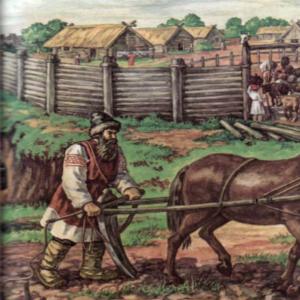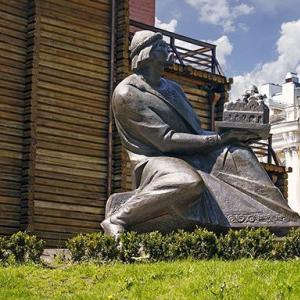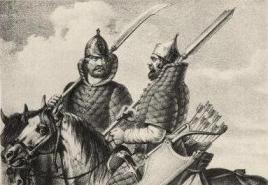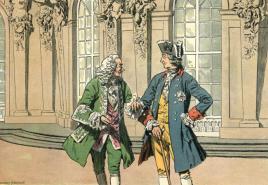Who was the philosopher on the throne? "Old Fritz": the carefree philosopher on the throne
Frederick was born at the very beginning of 1712. His father, the Prussian king Frederick William I, did not have warm feelings for his son. Their relationship was so bad that Frederick even tried to escape with his comrade-in-arms to England at the age of 18. When the young men were caught, Friedrich's comrade was executed immediately, but the prince himself was executed only as intended. However, it all ended in exile for several years.
“One can imagine how this vandal [Frederick I] was amazed and dissatisfied that his son was smart, witty, courteous and filled with a desire to please; that he strives for education and writes musical plays and poetry. If he saw a book in the hands of the crown prince, he threw it into the fire, if his son played the flute, he broke the flute. Sometimes he did the same to him as he did to women on the street and to preachers at a parade,” Voltaire recalled in his memoirs.
Source: wikipedia.orgHaving matured and become the King of Prussia, Frederick II was able to get rid of the vicious habits of his father, who, according to contemporaries, was engaged in hoarding, decorated his palace with pompous things, and placed there, for example, gold furniture that was useless for anything. Frederick II's apartments at Sanssouci were something completely different.
“Admiring the beauty and splendor of the palace chambers, you are amazed at how he himself lives. We saw a narrow bed in the corner of the room behind a screen. No robe, no shoes; The footman who was there showed us the nightcap that the king wore when he caught a cold; He usually kept his hat on, which was probably not at all convenient. In the same room, near the sofa, there was a table on which were writing instruments and half-burnt notebooks; we learned that there was something about the history of the last war, and the fire that destroyed the notebooks upset His Majesty so much that he abandoned his work,” Casanova, who personally met with Frederick the Great several times, wrote in his memoirs.
Despite the fact that Frederick invited great philosophers to his country and himself created a number of works, many German writers were convinced that the king underestimated national literature. “The contempt with which Frederick the Great treated our literature also affects us, our grandchildren,” wrote, for example, Heinrich Heine.
Meanwhile, to improve his talent, Frederick even specially invited the French thinker Voltaire to his palace. He taught him to improve his texts. In addition, Voltaire left extensive memories of his stay in Sans Souci.
 Source: wikipedia.org
Source: wikipedia.org
“Is it possible to resist a victorious king, a poet, a musician, who, in addition, pretends to love me! And so, finally, I set out again for Potsdam in June 1750. I was received wonderfully. The dinners were very pleasant. Maybe I'm wrong, but it seems to me that they said a lot of witty things: the king was witty and caused wit. The most amazing thing about this is that I have never felt more free at the table. I worked every day two hours with his Majesty; I corrected all his works, never forgetting to diligently praise what was good in them, while crossing out what was no good,” wrote Voltaire.
Frederick II was often called the "light-hearted philosopher", although he apparently spent a lot of time dealing with state affairs. He managed to build an almost flawlessly functioning state apparatus: officials were timid in front of the ruler and tried to work so as not to incur his wrath. At the same time, Frederick himself constantly traveled around his lands, studying how ordinary people lived. “No sovereign knew the life of his subjects better than Frederick,” wrote the historian of that time, Karl Becker, in his “World History.”
Another symbol of the era of Frederick the Great in Prussia was the eradication of bribery and embezzlement. “Giving everyone free access to him, Frederick was able to follow the progress of legal proceedings and learned every abuse of the law at first hand. In punishing such misdeeds of people, he was merciless, did not look at anyone, removed his favorites and even removed useful ministers if he saw that they were defending the guilty,” said Russian historian Fyodor Koni.
In addition to reforming his state, Frederick was invariably engaged in expanding its borders. In particular, he conquered the most important region of Silesia, the acquisition of which allowed Prussia to enter the list of the greatest European powers. In total, the territory of Prussia almost doubled during the reign of Frederick the Great. Many experts are inclined to believe that the transformation of the army, in which the king, who led it in all campaigns, instilled the strictest discipline, played a significant role in this.
“The king managed to develop such a method of attack and so organize his army that he was able, with the resources of a kingdom smaller than present-day Sardinia, and with the meager monetary support of England, to wage war against almost the whole of Europe,” wrote Friedrich Engels.
Many contemporaries, and even more so the French who hated Frederick, paid attention to the king’s personal life. The fact is that he was very cold towards his wife, who remained childless, but he paid a lot of attention to handsome men. This gave birth to a large number of rumors about Frederick the Great’s homosexual relationships, which, according to the recollections of contemporaries, the ruler did not hide too much.
“How can you condemn tenderness, you who knows ecstasy only in the arms of regimental drummers,” wrote the Duke of Choiseul, the Prime Minister of Louis XV, in one of his epigrams.
In one of his last wars - the Seven Years' War - Frederick the Great suffered a number of serious defeats from the Russian-Austrian coalition. The king was saved only by the death of the Russian Empress Elizaveta Petrovna. When Peter III ascended the Russian throne, he concluded a truce with Frederick and returned everything that had been won with such difficulty.
“To sum it up, Prussia at the end of the last campaign was close to complete collapse. According to all statesmen, she had already died: but she was able to rise again as a result of the death of a woman and thanks to the help of the state, which most actively acted to the detriment of Prussia,” said Frederick the Great himself.
Marcus Aurelius - “philosopher on the throne” (161-180)
Marcus Aurelius, Having become emperor, he immediately made him his co-ruler Lucius Commodus Vera, as Adrian once wished. The joint rule continued until the death of Lucius Verus in 168. Co-ruler Aurelius was not very interested in governing the state, he preferred to spend his leisure time in feasts and entertainment, and when he had to command an army during the war with Parthia (162-166), Lucius Verus showed himself as a mediocre commander, however, he was smart enough to actually transfer command into the hands of experienced commanders. However, the sources do not note anything villainous in his behavior, and Marcus Aurelius sincerely grieved when his sworn brother died.
According to the French historian E. Renan, Antoninus Pius would not have had a rival in the glory of the best monarch if he had not appointed Marcus Aurelius as his successor. It seemed that the dream of the Greek philosopher Plato had come true - a philosopher on the throne. Marcus Aurelius (Fig. 12.8), a famous Stoic philosopher, took upon himself all the worries associated with managing the empire, did not allow himself any luxury, was diligently involved in government affairs, paid great attention to legal proceedings, and expanded the alimentary system to an unprecedented extent. He left behind an original philosophical work - in form these are personal notebooks, which are usually published under the title “Reflections”. Marcus Aurelius tried to abolish the practice of communal bathing in baths, and demanded that only blunt weapons be used in gladiatorial fights - so that less blood would be shed in the arena. Not all of his activities were successful: he spent too much money on distributions to the people, the army, and the praetorians, he organized frequent and expensive games, constantly falling short of taxes and taxes.
However, this wonderful emperor was unlucky: it was during his reign that a number of troubles befell the Roman Empire (flood of the Tiber, earthquakes, a terrible epidemic), and most importantly, the barbarian periphery began to stir. Perhaps the long peace under Hadrian and Antonin was taken by neighboring peoples as a sign of the weakness of the Roman Empire. At the very beginning of Aurelius' reign, an uprising broke out in Britain, then the Parthians invaded the province of Syria and defeated the Romans (it was then that Lucius Verus went to the East). Only the Romans began to achieve success and took the Parthian capital Ctesiphon when a plague outbreak broke out and they had to make peace with Parthia (166), albeit on fairly favorable terms. The Roman legions, returning home from the Parthian war, spread the infection throughout all the cities and regions of the Empire through which their route lay. A terrible pandemic has engulfed Malaya
Asia, Egypt, Greece, Italy and Gaul. In Rome, up to 2,000 people died in just one day. Many areas were depopulated. After the plague subsided, famine began. People plunged into deep pessimism and greedily listened to all kinds of predictors and oracles.
Rice. 12.8.
Among all these troubles, the Germanic and Sarmatian tribes ( Hutts, Marcomanni, Iazyges, Quads etc.) broke through the Limes and poured into the territory of the Empire, devastating the border provinces: Dacia, Raetia, Pannonia, Noricum, and some crossed the Alps and rampaged through Cisalpine Gaul. Thus began the First Marcomannic War (166-168). Marcus Aurelius acted decisively and went to war himself. The passages to Italy were blocked, and some German and Scythian leaders were bribed to strike in the rear of the attackers. As a result, the invading barbarians were driven back across the Danube. However, a year later they again tested the Empire's strength - the Second Marcomannic War began (169-175). It was necessary to urgently recruit new legions, replenishing them with slaves and barbarians. By the mid-170s. The Marcomanni and their allies were forced to submit: Rome was still quite strong. Some of the prisoners were settled on Roman territory in the borderlands: they had to cultivate the land and serve in the Roman legions. This was a forced measure, a consequence of the decrease in the population of the Empire: in the future it would become one of the reasons for the “barbarization” of the Roman Empire.
In the interval between the Marcomannic wars, Marcus Aurelius had to go to the East, since the governor of Syria Avidius
Cassius declared himself emperor by spreading a rumor about the death of Aurelius or taking advantage of a rumor that was circulating. The rebellion was short-lived; Cassius was killed by his own supporters before the emperor arrived. Aurelius treated generously both the ordinary participants in the rebellion and the senators associated with Cassius, without putting anyone to death.
Deciding that only an active policy was the guarantee against a new invasion, Marcus Aurelius, together with his son Commodus, whom he appointed as his co-ruler, went to the Third Marcomannic War (178). The Romans gained the upper hand, but in the camp at Vindabona (Vienna), Marcus Aurelius fell ill and died in 180. When his body was transported to Rome, the people were already showing him divine honors.
Exercise
Who owns the phrase or what famous Roman figure is it associated with? Remember under what circumstances and in connection with which it was pronounced.
- However, I believe that Carthage must be destroyed.
- Fate helps the brave.
- I came, I saw, I conquered.
- Quintilius Varus, bring back the legions!
- Money doesn't smell.
- O times! O morals!
- Die is cast!
- Let them hate, as long as they are afraid.
- What artist in me is dying! the times of Nero or Domitian have returned. At the same time, the emperor tried to appease the praetorians by increasing their salaries, and to gain the favor of the people by arranging distributions and spectacles for them.
Creative task
Write a review of the movie Gladiator (2000). Consider the following points: How does the film portray the personalities of Emperors Marcus Aurelius and Commodus? How does the film correspond to historical realities? How are historical events reflected? Did the filmmakers manage to harmoniously combine fiction and historical accuracy?
In 192, a new conspiracy arose under the leadership of the praetorian prefect Aemilius Letus. Among the conspirators was Commodus' mistress Marcia; she brought the emperor a cup of poison, but it either did not work or acted slowly, and Commodus was eventually strangled in the bathhouse by his sparring partner in the exercises.
- Renan E. Marcus Aurelius and the end of the ancient world. Yaroslavl, 1991. P. 9.
Omsk State Technical University
HOMEWORK (option 10)

Completed
student gr. RIB-223:
2015
Work plan:
Philosophy of Marcus Aurelius.
Core Virtues (According to Stoic Philosophers)
The relevance of the judgments of Marcus Aurelius Antoninus.
Conclusion.
Marcus Aurelius Antoninus – “philosopher on the throne”
MARK AURELIUS ANTONINUS(Marcus Aurelius Antoninus) (121–180) seemed to me a very interesting person, because he is at the same time a Stoic philosopher, a Roman emperor (from 161), and a warrior. This is probably the only Roman monarch who left behind a book of reflections for his descendants.
“Marcus Annius Catilius Severus, who went down in history under the name Marcus Aurelius, was born in Rome on April 26, 121 and was the son of Annius Verus and Domitia Lucilla. Marcus Aurelius treated his mother with deep respect and believed that he owed her “piety, generosity and abstinence not only from bad deeds, but also from bad thoughts, as well as a simple way of life, far from any luxury” (1)
After the death of his father, he was adopted by Emperor Antoninus Pius and gave him the name Marcus Elius Aurelius Verus Caesar. Marcus Aurelius received an excellent education at home. Diognet taught him philosophy and painting. According to Mark himself, Diognetus freed him from superstitions. He forced him to practice writing and thinking, and write dialogues. Under the influence of the philosophical treatises he read, Mark began to sleep on bare boards and cover himself with animal skin.
Almost nothing is known about the life of Marcus Aurelius up to 161. “After the death of Emperor Antoninus Pius, Marcus Aurelius was proclaimed emperor in 161. He immediately asked the Senate to grant equal powers to Antoninus Pius's other adopted son, Lucius (Lucius Verus (161–169)). This was the first case of a joint principate in the Roman Empire.”(1) During the period of joint rule, the final word belonged to Mark Antony. Lucius Verus was distinguished by his penchant for wild life.
The entire reign of Marcus Aurelius was accompanied by a number of military conflicts: an uprising in Britain; attack by the Germanic Hutt tribe; the capture of Armenia by the Parthians. In addition to wars, the empire was undermined by other disasters. Thus, returning from the victory over Mesopotamia, the troops brought a deadly epidemic into the empire, which claimed the lives of many people. Then came other disasters: famine, floods, earthquakes. Difficult times for the fading empire and its emperor!
Paradox: Marcus Aurelius was prone to reflection all his life, but spent most of his reign on military campaigns
“In 169 Lucius Verus died, and Marcus Aurelius remained sole ruler. From 170 to 174 he was with the active army on the Danube, fighting with the Marcomanni and Quadi. In 175, the governor of Syria, commander Gaius Avidius Cassius, who had the broadest powers in the East, took advantage of rumors about the death of Marcus Aurelius and declared himself emperor. The rebellion was quickly suppressed, Cassius was killed, but the emperor was forced to leave the Danube region, satisfied with the conquests achieved. The Romans invited barbarian tribes to settle in the empty lands north of the Danube, demanding from them only the protection of Roman borders. These were the first steps towards settling the remote borders of the empire with foreigners.
Marcus Aurelius returned to Rome in 176. He carefully monitored the actions of the local administration and paid much attention to legislative reform and tax collection. Supported traditional Roman religion as an important part of the state system.
In 177 Marcus Aurelius made the son of Commodus his co-ruler and again set out on the Danube border. There, in 180, Marcus Aurelius died suddenly (possibly from the plague). This was the last of the “five good emperors” in Rome.”(2)
The reign of Marcus Aurelius was called the last “golden age” of Rome. The Romans did not see off any of their emperors on their last journey with such sorrow and respect. The people were sure that after his death Marcus Aurelius returned to the abode of the Gods.
Historian Ilya Barabash wrote about the emperor’s reign: “His commands outraged many of his compatriots. Why! He sends gladiators to war so that they do not die senselessly while the crowd screams. He orders mats to be laid under the equipment for the gymnasts’ performances. He's depriving the Romans of spectacle! He is too merciful towards slaves and poor children. And it demands too much from the powers that be! He is not treacherous even towards enemies and even for the sake of military victories. He’s crazy!.. And he’s just a philosopher, a Stoic philosopher, who believes that man is essentially free and no problems can force him to act against his conscience.”(3)
Philosophy of Marcus Aurelius Antoninus.
Marcus Aurelius was one of the last representatives of the Late Stoa. His only work, his philosophical diary, is “To Myself.” In this work, he appears before us as both a wise teacher and an attentive student. His thoughts focused on practical ethics, epistemology and, to a lesser extent, cosmology. “Happiness lies in virtue - philosophical agreement with universal reason. We need to turn “to ourselves,” to conform our rational principle (which is the only one in “our power”) with the nature of the whole and thus gain “dispassion.” Everything is predetermined from time immemorial; the sage takes fate for granted and loves his lot. However, the philosopher is interested in justifying the autonomy of moral choice. Virtue must be subject to a causality other than natural phenomena: a person must make himself worthy of divine help. What brings Marcus Aurelius closer to Seneca, Epictetus, as well as to the Christian teachings are calls for humanity, for caring for the soul, for awareness of one’s sinfulness.”(6)
I believe that Judgment can be considered key for Stoic philosophers Marcus Aurelius Antoninus: “Love the humble work that you have learned, and rest in it. And go through the rest, wholeheartedly entrusting everything that is yours to the gods, and making no one from among the people either your master or your slave.” He considered the main goal in life to be search and self-improvement, and this search is based on human self-sufficiency. All people, according to this philosophy, are equal. Marcus Aurelius considers everything that happens in the world as a manifestation of nature, which is God - an active, intelligent principle, passing through the whole world and uniting it into a single whole. A person must actively cooperate with the world, that is, with God, because in the world everything happens according to its natural laws. This is the principle of acceptance or generosity. Marcus Aurelius considered. that activity for the benefit of people - in any, even the simplest and most ordinary matter - lifts, elevates a person, gives him happiness. After all, happiness, according to the Stoics, is life in harmony with nature, adaptation to environmental conditions, reasonable self-preservation, peace of mind and freedom from passions. And it was Marcus Aurelius who wrote the words: “If you cannot change your circumstances, change your attitude towards them.”
These thoughts are continued by the following judgment: “If circumstances seem to force you into confusion, quickly retreat into yourself, without retreating from the harmony more than you are forced to, because you are more likely to master consonance by constantly returning to it.”
According to the philosopher, if insoluble problems arise in the external environment, a person must look for a way out of the situation within himself. It is useless to pour out your feelings outside, to seek help from others, this will not help, but will only aggravate the problem. The inner, spiritual world of a person is the source for any development. You need to talk through the problem within yourself, look at it from different angles, get used to it, and a way out will be found. So in music - a complex consonance, disturbing the soul and difficult to reproduce, must penetrate the thinking and feelings, fill a person from the inside. And then a person will easily master it. “Be strong within yourself. A rational leader is by nature self-sufficient if he acts fairly and thereby remains silent,” says Marcus Aurelius in his diary. 3. The cardinal virtues (according to the Stoic philosophers)
“The Stoics recognize four cardinal virtues : rationality, moderation, justice and valor. The main virtue in Stoic ethics is the ability to live in accordance with reason. The basis of Stoic ethics is the assertion that one should not look for the causes of human problems in the external world, since this is only an external manifestation of what is happening in the human soul. Man is part of the great Universe, he is connected with everything that exists in it and lives according to its laws. Therefore, man’s problems and failures arise due to the fact that he is divorced from Nature, from the Divine world. He needs to meet Nature, God, and himself again. And to meet God means to learn to see the manifestation of Divine Providence in everything. It should be remembered that many things in the world do not depend on a person, but he can change his attitude towards them.”(8)
There were legends about the meek love of the Roman Emperor Marcus Aurelius for his wife Faustina during both of their lifetimes. The whole empire knew how depraved and cruel Faustina was. Nevertheless, he humbly accepted her as she was.
The Roman Emperor Marcus Aurelius had a great idea of how his wife spent her time. But we should not forget that Marcus Aurelius was a prominent philosopher of his time. And he accepted life’s adversities with philosophical calm.
Last of five
Marcus Aurelius was born in 121 in Rome into the family of a senator. The future ruler was orphaned early - his adoptive father was Emperor Antoninus Pius, the fourth of the so-called “five good emperors” (the fifth later became Marcus Aurelius). The adoptive father gave his son an excellent education - the boy showed a great thirst for knowledge from childhood. He brilliantly mastered everything he was taught.
Even in his youth, the future “philosopher on the throne” became an adherent of stoicism, the essence of which was a courageous and philosophical approach to troubles and blows of fate.
At an early age, he married Annia Galeria Faustina (more often called simply Faustina), the daughter of Antoninus Pius. And although this marriage produced 13 children (only four survived to adulthood), the emperor’s marriage could hardly be called serene. It seems that only one person did not hate the emperor’s wife - Marcus Aurelius.
In 161 Marcus Aurelius ascended the Roman throne. For the first eight years he ruled jointly with Lucius Verus, his half-brother. It must be said that the emperor was no more fortunate with his co-ruler than with his wife. While Marcus Aurelius delved into the state affairs of a huge empire, Lucius Verus indulged in the most unbridled debauchery. Nevertheless, the ruler did not reproach his relative and sincerely mourned his death in 169.
Since 169, Marcus Aurelius ruled alone. What can you say about his beloved wife Faustina? There were different reviews about her appearance. Some thought she was pretty. Others believed that Faustina was not attractive. The woman was spoiled by her bulging eyes: apparently, the empress suffered from Graves' disease. But the disadvantage did not in the least prevent her from living a varied intimate life.
In her younger years, Faustina chose her lovers from fishermen and gladiators. At first, she had a passion for young athletic men from the lower strata of society, which, of course, greatly disgraced her husband. Here, for example, is how the historian Julius Capitolinus describes the story of the appearance of Commodus, the son of Marcus Aurelius, who succeeded him on the throne: “Some say ... that Commodus Antoninus, his successor and son, was not born from him, but was the fruit of adultery, and add to this such a fairy tale that lives in popular rumor: once Faustina... at the sight of gladiators passing by, was inflamed with love for one of them - and after long suffering caused by a love illness, she confessed her love to her husband. When Mark turned to the Chaldeans, they gave advice to kill this gladiator, so that Faustina would wash herself in his blood and then lie down with her husband. When this was done, Faustina, however, was freed from love, but Commodus was born - rather a gladiator than an emperor: as an emperor, he appeared publicly before the people almost a thousand times in gladiatorial battles, as will be indicated in his biography.
From gladiators and fishermen, the empress switched to actors. But those were only flowers.
The situation in the country was greatly complicated by the fact that Faustina one day began to choose representatives of the highest aristocracy as her lovers. And as you know, where you know, there is intrigue. To begin with, the libertine entered into a relationship with Lucius Verus, who was as dissolute as herself. And this despite the fact that he was married to her daughter!
Bloodthirsty wife
Further more. Faustina for some reason considered her husband a weak ruler: the woman, apparently, was embarrassed by his, from her point of view, insufficient bloodthirstiness. At the instigation of the empress, her lover and concurrently governor in Syria, Avidius Cassius, rebelled and declared himself emperor. Faustina chose what she thought was a good moment: Marcus Aurelius, who had not been in good health since childhood, fell ill once again. But her husband pulled out, and Faustina was completely horrified by what she had done. She was terribly afraid that Avidius Cassius would tell everyone about his conversations with her. And the empress began bombarding her husband with letters in which she begged him to execute the dangerous rebel. This is what the bloodthirsty woman wrote: “...But I earnestly ask you, if you love your children, to deal with these rebels in the most severe manner. Both commanders and warriors are accustomed to acting criminally; if they are not suppressed, then they themselves will suppress...
After all, one cannot call an emperor loving who does not think about his wife and children. You see for yourself at what age our Commodus is... Think about what to do with Cassius and his accomplices. Do not give mercy to people who did not spare you and would not have spared me and our children if they had won..."
And Faustina, it must be said, achieved her goal: the head of Cassius was brought to Marcus Aurelius as a trophy. The emperor was not happy: madly in love with his wife, the ruler remained an intelligent man. He could not help but understand that the ruler of Syria had fallen victim to cynical intrigues.
"Reflections about oneself"
Nevertheless, in his book “Reflections on Oneself,” the emperor speaks warmly about his life partner and shares his views on life with readers: “Love only what has been given to you and measured out. What is more appropriate than this?.. When you are offended by someone’s shamelessness, ask yourself right away: can the shameless not be in the world? Can not. Then don't demand the impossible. This one is one of those shameless ones that should be in the world.”
Faustina was aroused by the very sight of blood - she accompanied Marcus Aurelius on all his summer military campaigns. The emperor's associates turned up their noses at the cruel and insatiable empress in every sense. And the touched ruler called his wife nothing more than “the mother of the camps.” During one of these campaigns, Faustina died from an unknown illness. This happened in 176.
Marcus Aurelius mourned his wife inconsolably. The Senate, under the influence of the emperor, declared Faustina divine. In her honor, they founded something like the Order of Faustinian Girls. In the place where his wife died, the ruler erected a temple in her name.
All these honors made the Romans just shrug their shoulders. The country fell into true mourning four years later, when Marcus Aurelius died of the plague.
This is how the Greek historian Herodian describes these days: “After the death of Mark, when rumors about it spread, the entire army that was there, as well as the mass of the common people, were overwhelmed with grief, and there was not one of the people subject to Rome who would hear such a thing without tears. news; everyone, as if with one voice, loudly called him: one - an excellent father, others - a good sovereign, others - a wonderful commander, others - a temperate and modest ruler, and no one was mistaken.
After his death, among his belongings, notes were discovered that the emperor kept on his campaigns. Later they will be published under the titles “Alone with Oneself” and “To Oneself.” It can be assumed that the manuscripts were not intended for publication, because the author really turned to himself, indulging in the pleasure of reflection and giving his mind complete freedom. But empty philosophies were not characteristic of him. All the emperor’s thoughts concerned real life.
Marcus Aurelius was replaced by his cruel and insignificant son Commodus, who became the second Nero for Rome. He did not go down in the history of the empire as another “good emperor.” The once brilliant Antonine dynasty ended with the stupid and dissolute Commodus.
Maria KONYUKOVA
Views: 195







